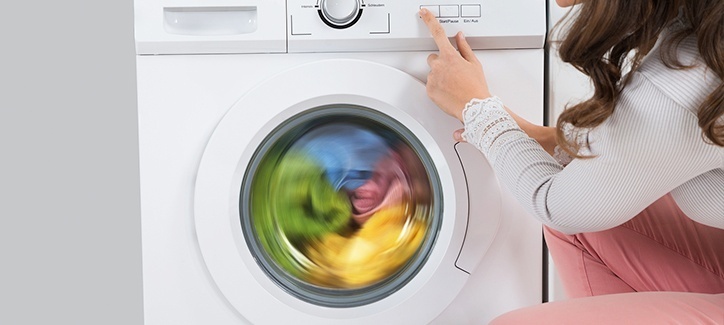 Water damage can wreak havoc on your home, causing some of the most substantial and expensive destruction. Water damage can destroy your belongings, as well as damage the structure and stability of your home. The big issue is that a lot of water damage comes from seemingly innocent places like leakage from common household items like washing machines and ice makers.
Water damage can wreak havoc on your home, causing some of the most substantial and expensive destruction. Water damage can destroy your belongings, as well as damage the structure and stability of your home. The big issue is that a lot of water damage comes from seemingly innocent places like leakage from common household items like washing machines and ice makers.
Quick Maintenance Tips
Make a habit of inspecting the hoses attached to your washing machine and icemaker on a regular basis. Look for things like water spots, pooling water or mold growth. In the hoses themselves, look for kinks or cracks in the hoses.
The best bet to preventing breakage is to make sure that your hoses are changed on a regular basis (i.e. every five years or so). Many washing machine hoses are rubber, which is prone to breakage with age. You should use metal braided hoses for durability and integrity. Make sure you tag hoses with the date so that you’ll remember when to replace them.
Washing Machine Tips
When it comes to your washing machine, taking care to inspect and maintain the hoses will go far in helping you avoid leaks and water damage. A washing machine hose rupture can literally spill hundreds of gallons of water in an hour.
When you are installing hoses, make sure that you’ve tightly secured the connection from the washing machine to the valves, tightening with pliers. You’ll also want to have plumber’s Teflon tape to ensure a tight and leak free connection. Make sure to check valves for leaks as well. You’ll want to double check that valves are not corroded, which can cause deterioration and leakage, as well as make it difficult to turn off the water supply in an emergency. Similarly, make very sure that the discharge hose is secured to the pipe or drain. For extra snugness, use a zip tie or duct tape to secure the discharge hose.
To ensure extra protection against water damage, you may also want to install a drip pan under your washing machine to catch any leaks before they come in contact with your floor, causing rot and damage. Typically however, overflow pans have a drain line connected to a waste line or sump pump.
Icemaker Hose Tips
Your icemaker works around the clock to make sure that you’ve got ice at the ready to cool your beverage. However, even a small leak can mean serious damage to your kitchen floor and walls.
As a first step, make sure that hoses are tightly secured to the appliance and that they are secure to the water supply line on the other end. A loose fitting hose can be the culprit in a leak situation. If you have an older home, you may discover that you have a “saddle valve” (i.e. a valve that “saddles” the line from both sides). It’s a good idea to get these replaced by a licensed professional. Although easy to install, saddle valves are prone to leakage and do not comply with today’s building codes. Make doubly sure that the connection doesn’t pierce the line or the hose.
Specifically, for the supply line, using copper is best. Copper is the sturdiest option out there and is less likely to corrode or break down over time. Make sure that the supply line is laden with well-spaced loops so that they don’t get pulled out easily. Also check that there are no kinks in the line.
To stop water damage before it starts, you’ve got to pay particular attention to the hoses on washing machines and icemakers, and take the necessary action as soon as you notice a problem.
Water Damage
If your home or building has been impacted by water damage, Cornerstone Appraisal and Restoration Services can help.




